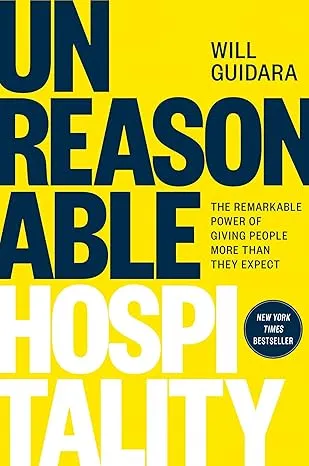About this book
Five Key Takeaways
- Unreasonable hospitality transforms service into memorable experiences.
- Operating with intention enhances connections between staff and guests.
- Going above and beyond instead of merely meeting expectations.
- Clear expectations empower teams to provide exceptional service.
- Collaboration fosters a passionate and innovative hospitality culture.
-
People Crave Emotional Connections
Unreasonable hospitality creates extraordinary experiences by prioritizing genuine emotional connections over transactional interactions (Chapter 1).
When customers feel emotionally valued, their loyalty and satisfaction increase significantly. In a digital world, people seek meaningful, heartfelt experiences.
Businesses often prioritize efficiency, missing emotional opportunities to genuinely connect with customers. This gap can make interactions feel routine and forgettable.
Customers don’t just buy products or use services; they remember how those experiences made them feel. Emotions play a lasting role in loyalty.
The consequences of ignoring emotional connections are clear: missed opportunities to build memorable relationships and lower customer retention and loyalty.
Conversely, businesses that embrace unreasonable hospitality see transformative results. Guests feel deeply appreciated and form strong attachments to the brand.
As a result, businesses thrive on word-of-mouth recommendations and returning customers—advantages rooted in emotional bonds rather than superficial service.
This fact underscores why hospitality should shift from transactional to deeply intentional and emotionally resonant practices universally.
-
We Must Prioritize Thoughtful Intention
Businesses often prioritize speed and results, neglecting thoughtful intention in their service approach. This creates impersonal and hollow customer experiences.
The problem intensifies when companies ignore the emotional wants of employees and clients, which take a backseat to operational efficiency.
Without intention, hospitality becomes cold and mechanical, leaving customers and staff disconnected, unfulfilled, and uninspired.
The author believes intention transforms experiences. It fosters personalization, making businesses stand out in a crowded, competitive marketplace.
Prioritizing thoughtful gestures gives people a sense that they genuinely matter. This builds excitement, connection, and an atmosphere of warmth.
The author backs this with stories illustrating how being intentional creates magical guest moments that are impossible to forget (Chapter 2).
Implementing intent-based service practices in all industries creates ripple effects. It inspires loyalty, boosts satisfaction, and brings back the human touch to service.
This perspective challenges organizations to redefine their idea of excellence as making people genuinely feel valued, not just meeting functional needs.
-
Exceed Expectations Through Small Gestures
In hospitality, forgetting transactional service and focusing on delighting your guests elevates the experience to extraordinary levels.
Look for simple ways to surprise customers. For instance, solve a small inconvenience or offer a personal, thoughtful gesture.
Invest in understanding individual guest needs through personal attention. Anticipate moments where thoughtful actions can create lasting memories.
Creating seemingly minor, unique moments for a guest can be far more impactful and lasting than grand, generic gestures.
For example, thoughtful surprises like rescuing forgotten items or enhancing celebrations foster loyalty and deepen emotional connections (Chapter 3).
Exceeding expectations inspires repeat business, sets you apart from competitors, and turns customers into enthusiastic brand ambassadors.
Neglecting small touches misses impactful, value-rich moments that differentiate between good service and truly extraordinary hospitality.
-
Establish and Reinforce Clear Expectations
Unclear expectations among staff create inconsistent and lackluster customer experiences, which harm team cohesion and guest satisfaction.
Set clear, achievable goals for employees and communicate roles, standards, and desired outcomes in detail during training sessions.
Track progress via feedback and regular adjustments, addressing employee needs or weaknesses to ensure consistency in service delivery.
Clear expectations make employees more focused, empowered, and confident, leading to smoother operations and better guest interactions (Chapter 4).
Creating such a culture strengthens organizational identity, builds staff pride, and ensures customer-facing teams always deliver memorable service.
Over time, consistent reinforcement of expectations helps scale excellence across teams without compromising authenticity and core values.
-
Exceptional Hospitality Demands Generosity
Hospitality success often focuses more on processes and transactions rather than meaningful, generous, human connections with guests.
The issue arises because traditional business models treat generosity as optional—something reserved for special occasions or loyal customers only.
This mindset limits business potential. Guests don’t just consume services; they remember how they were emotionally treated and whether they felt cared for.
Generosity in hospitality must be spontaneous, woven into daily practices instead of myths or rare moments. True giving outshines rigid standards.
The author emphasizes that regular acts of generosity—like personalized surprises—leave deeper impressions than formal perfection (Chapter 3).
Evolving from rigid systems into environments of genuine generosity ensures guests feel more than satisfied; they feel genuinely appreciated.
This redefinition of exceptional service shifts hospitality from measured adequacies to standout experiences that delight guests repeatedly over time.
-
Culture Drives Scalable Success
Strong culture sustains businesses during growth. Without it, scaling risks losing values that define exceptional hospitality (Chapter 7).
When employees embody a culture of hospitality, they deliver experiences reflective of shared values rather than individually isolated efforts.
Rushed scaling or minimal investments in culture-building create fragmented teams with poor service quality and dissatisfied clients.
Investing in ongoing training and allowing employees ownership ensures consistency in embodying the heart of hospitality as businesses expand.
Such enterprises overcome challenges proactively, preserving the mission and personality their customers love—even across different levels.
The result? Improved morale, sustained growth, and a continuous edge in competitive markets—all while preserving the company ethos.
-
Nurture Collaboration in Your Team
Teams working under rigid, hierarchical systems limit creativity, decrease enthusiasm, and impact service quality due to low collaboration.
Create a culture where employees, regardless of rank, confidently share input on improving operations, guest experience, and service.
Encourage experimentation, letting employees lead projects or solve challenges that align with their personal passions or skills.
A collaborative team boosts emotional investment, increases collective trust, and drives creativity in problem-solving (Chapter 6).
Giving ownership enriches workplaces. Employees thrive on responsibility, boosting morale and ensuring innovative service for guests.
Teams motivated by collaboration consistently outperform those stuck in rigid commands, granting businesses a lasting competitive advantage.




















